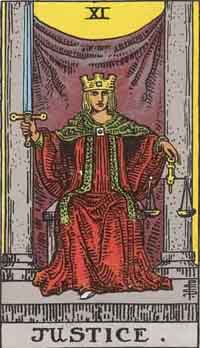

Today's Date: 03 Nov 2025

According to The Pictorial Key to the Tarot by A.E. Waite, Justice is described as the following:
As this card follows the traditional symbolism and carries above all its obvious meanings, there is little to say regarding it outside the few considerations collected in the first part, to which the reader is referred.
It will be seen, however, that the figure is seated between pillars, like the High Priestess, and on this account it seems desirable to indicate that the moral principle which deals unto every man according to his works--while, of course, it is in strict analogy with higher things;--differs in its essence from the spiritual justice which is involved in the idea of election. The latter belongs to a mysterious order of Providence, in virtue of which it is possible for certain men to conceive the idea of dedication to the highest things. The operation of this is like the breathing of the Spirit where it wills, and we have no canon of criticism or ground of explanation concerning it. It is analogous to the possession of the fairy gifts and the high gifts and the gracious gifts of the poet: we have them or have not, and their presence is as much a mystery as their absence. The law of Justice is not however involved by either alternative. In conclusion, the pillars of Justice open into one world and the pillars of the High Priestess into another.
This card shows us a bold character seated with a pillar on either side. In one hand, the figure holds up a straight sword pointing upward; in the other, they hold scales that hang down. This is the Justice card, and it invites us to think about truth, law, and the dissimilar sides to a single issue.
You don’t have to be a lawyer to consider law and truth in your life, though we may think of a lawyer first when we consider these topics. We might not think that we are qualified to handle questions of justice, or that we have anything valuable to say or do in these realms. Our card today, however, suggests that we should think again.
We likely don’t know the specific laws for where we live like the back of our hand, but just because we don’t have the knowledge that a lawyer possesses about the justice system doesn’t mean that we don’t have our own capacities for working toward justice in our lives.
We can start by considering the nature of truth and developing skills to resolve questions of right and wrong.
Let’s consider justice in our lives on a smaller scale. Outside of a courtroom, there are places when our honesty and culpability—as well as the honesty and culpability of others—are brought into question.
For instance, we might disagree with a colleague or family member about who was or wasn’t supposed to do something, and who should take the fall for the misstep now. On a very small scale, this misstep could be as simple as jamming the printer or not taking the garbage out.
But most of us will know that the size of the original task or event that caused a conflict is meaningless. Huge blow-ups can result from the tiniest of infractions. This has much to do with the fact that tensions build up between people over time, and sometimes a small event must take place before they can come to a head.
But what happens when they do reach a breaking point? What happens when people disagree on the truth of the situation in a way that causes suffering on both sides?
This is where conflict resolution comes into play. If you have a conflict, your options are to ignore it, inflame it, or attempt to resolve it. Of course, resolution is the healthiest option, but this doesn’t make it the simplest.
Today, as even the most minute of conflicts arise in your life, imagine you are a lawyer in a courtroom who has come to resolve an issue peacefully, open-mindedly, and communicatively. Tell the other people involved in any issues as soon as you recognize them to be a problem. Working through things quickly is like treating a wound before it has time to fester.
Acknowledge that the truth is subjective and that you, too, have played a role in this issue. Show that you are listening to the other person when they speak. Put yourselves in their shoes so you can connect with what they are saying. Do all of this with empathy before you even begin to talk about your own opinion.
Remember that you are not fighting to show the other person why your opinion is correct. Instead, you are like the Justice card, fighting to find the justice at the heart of the situation and truly understand where the other person is coming from.